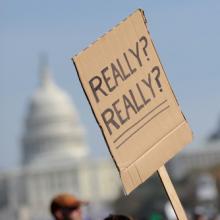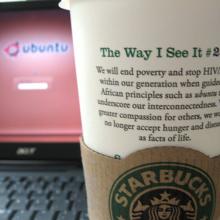Tea Party
t’s also one of the most divisive political issues on the Hill right now. Here’s why: The notion of "fast tracking" trade deals with almost no congressional oversight has led to the creation of odd alliances — putting the Democrats and Tea Party in one camp (against), and the Republicans and Obama Administration (for) in another. Pro-business Republicans are long time supporters of free trade, while members of the Tea Party are against most anything that would allow the President to usurp legislative authority. As for Democrats, they argue that the TPP would allow multinational corporations to undermine labor safeguards, civil rights, environmental protection and healthcare, and derail urgent efforts at fighting climate change. Organizations typically aligned with President Obama are against him here: labor unions, environmental groups, and even traditionally non-political groups have fought hard against Fast Track and the TPP.
Indeed, the potential harm from the trade deal seems to leave few interest groups untouched. To provide just a few examples, Doctors Without Borders has called the TPP the "worst trade deal ever," claiming that it will cause millions to lose access to life-saving medicines; left-leaning Global Exchange has pointed to the increasing number of sweatshops such a framework would lead to; and the digital rights organization Electronic Frontier Foundation has expressed its belief that the TPP would put overly restrictive controls on the internet. And we’ve already seen our political leaders weaken standards for protection against human trafficking and child labor should the trade deal move forward.
These are all compelling arguments, and they are ones faith groups are making as well.
WHEN MARK TWAIN supposedly said “reports of my death have been greatly exaggerated,” he didn’t know he was establishing a tweet for the ages. (He didn’t use Twitter. He was more of an Instagram guy.) It still stands as the best rejoinder to those who insist on seeing things for what they aren’t.
Politically speaking, pundits and legislators alike were guilty of prematurely identifying the cold carcass of the tea party last spring when establishment Republicans defeated their right-wing rivals in several primaries. Then came Eric Cantor who, as a Jew, never really fit the profile of an evangelical Christian, the preferred qualification for tea party membership. But as majority leader of the House, he was powerful and occasionally clear-spoken, two other characteristics not often found in tea party favorites.
Nonetheless, Cantor went down to defeat at the hands of an underfunded college professor whose only apparent advantage was a more-evangelical hair style. But his secret weapon was his intolerance for undocumented workers, a favorite position for tea party Americans whose food is harvested almost exclusively by undocumented workers. But let’s not quibble. People are entitled to their opinions, even if the food on their plates sits in mute repudiation of those beliefs. (Luke said “the stones will cry out,” but I’d be happier if a bowl of vegetables would just stand up and say a few cryptic words before dessert.)
So now Eric Cantor’s political career is over, and he moves on to the pitiable life of a wealthy lobbyist who, through no fault of his own, must replace a deep sense of social responsibility with a couple really nice cars. Better that than the consequences for Cantor’s pollster, who predicted a 34 percent victory for his boss. (“Clean-up on aisle 12.”)
WHAT IS THE relationship between one’s religious beliefs and one’s economic and political views? Are some religious beliefs more “American” than others?
These questions come to mind in reading Samuel Gregg’s Tea Party Catholic: The Catholic Case for Limited Government, a Free Economy, and Human Flourishing. Gregg suggests that religion directly informs—or should inform—our understanding of political and economic issues and that religious, economic, and political liberty are inextricably bound. A perceived or real “attack” on one, he contends, is an attack on all.
Gregg is director of research for Acton Institute, a libertarian think tank whose core principles seek the “integrating [of] Judeo-Christian truths with free market principles.”
In Tea Party Catholic Gregg writes of a “new type of Catholic American” who is grounded in a “dynamic sense of orthodoxy” but whose “Americanness” is defined by faith in free market principles. Tea Party Catholic details how free market principles and a view of government “with clear but constrained economic functions” have, Gregg argues, not only deep roots in U.S. political history but also in Catholic tradition. Thereby, he suggests, any U.S. Catholic differing in his or her economic and political beliefs has neither a proper understanding of the United States’ founding nor of the teachings of the Catholic Church.
Gregg’s attempt to sacralize libertarianism is not consistent with Catholic doctrine: It runs counter to stated positions of the Vatican and the majority of Catholic theologians and economists. At a recent conference at The Catholic University of America one of Pope Francis’ advisers, Cardinal Oscar Rodríguez Maradiaga, said that in commenting on free market and libertarian influences on our global economy, Pope Francis gave a “sharp prophetic verdict: ‘This economy kills.’”
Yesterday was one of the craziest days in recent American political history. House Majority leader Eric Cantor fell to Tea Party economics professor David Brat in a primary upset no pundit saw coming.
While the early analysis suggested that support for immigration reform may have been what brought Cantor down, exit polling suggests his lack of attention to the concerns of his constituents and his inability to deliver on his promises were a greater factor than the immigration issue. Cantor never brought a vote on immigration to the floor and was never a strong ally on immigration.
Earlier on Tuesday, the Public Religion Research Institute (PRRI) released an immigration poll at the Brookings Institute. Nearly 80 percent of all Americans and nearly two-thirds of white evangelical Protestants remain in support of immigration reform that includes a path towards citizenship or legal status.
The two most critical requirements for democracy are freedom of the press and an educated citizenry.
The one informs the people and brings government and power into the open. The other enables people to comprehend information and to discuss opinions without resorting to panic and violence.
Power elites have declared war on both requirements.
These include “big money” oligarchs, such as the people who gather around the Koch brothers, politicians who cater to the wealthy in exchange for campaign contributions and government officials who have come to identify with the corporate and financial interests they regulate.
Through acquisitions of newspapers and television outlets and intimidation of reporters, these power elites seek to turn the press into propaganda vehicles and to distort information.
Nearly every home has at least one Bible, although few read it.
But 16 percent of Americans log on to Twitter every day. And that’s where author Jana Riess takes the word of God. A popular Mormon blogger at Religion News Service and author of “Flunking Sainthood,” Riess spent four years tweeting every book of the Old and New Testaments with pith and wit.
Now, the complete collection — each chapter condensed to 140 characters — is on sale as “The Twible,” (rhymes with Bible) with added cartoons and zippy summaries for each biblical book.
Her tweets mix theology with pop-culture inside jokes on sources as varied as ”Pride and Prejudice,” “The Lord of the Rings,” and digital acronyms such as LYAS (love you as a sister). To save on precious character count, God is simply “G.”
(Editors’ Note: Sojourners is running an ad in Rep. King’s district. Watch the ad and click here to learn more about it.)
Business leaders, law enforcement officials, and evangelical Christians—key constituencies that are typically part of the Republican base—have been at the forefront of immigration reform. Given the obvious benefits of, and broad public support for, immigration reform, why are many arch-conservatives in the House of Representatives refusing to address the issue in a serious way? The answer may point to an issue that we still hesitate to talk about directly: race.
Fixing our broken immigration system would grow our economy and reduce the deficit. It would establish a workable visa system that ensures enough workers with “status” to meet employers’ demands. It would end the painful practice of tearing families and communities apart through deportations and bring parents and children out of the shadows of danger and exploitation. And it would allow undocumented immigrants—some of whom even have children serving in the U.S. military—to have not “amnesty,” but a rigorous pathway toward earned citizenship that starts at the end of the line of applicants. Again, why is there such strident opposition when the vast majority of the country is now in favor of reform?
When I asked a Republican senator this question, he was surprisingly honest: “Fear,” he said. Fear of an American future that looks different from the present.
DESPITE THE heart-felt and hand-written requests from thousands of American children in their Christmas letters, Santa has just announced he cannot bring them a new Congress this year. He tried, Santa wants us all to know; he tried hard. But he and his elves finally gave up when even the parts imported from China couldn’t make the thing work.
They first attempted to construct something with U.S.-made components, but it was almost as if the parts didn’t want to work together, like they had minds of their own. This surprised the elves since Congress—which has no apparent moving parts—hasn’t had a sentient thought in years.
However, as a small concession to all those disappointed little children, Santa this year will be honoring Christmas wishes that have traditionally been difficult to fulfill.
If Sally from Shreveport can’t get a workable electoral body in the nation’s capital, then she gets a pony. Simple as that. She asked for it last year—in fact she’s been asking for a long time—but this year she’ll get it. If her parents are not sure what to do with a 600-pound animal that requires constant attention and care, then maybe next time they’ll think twice before voting for a member of Congress who wears a three-cornered hat and proudly refuses to be treaded on, even though nobody’s trying.
When I was seven years old in the mid-‘80s, Mom started taking my brother Marco and me to Grace Bible Baptist Church and School in rural New Hampshire. We’d pass by all these well-attended, high-steepled liberal churches to worship in a squat, utilitarian building hidden on a back road in the woods, with a congregation of 30 or 40 strong: The Moral Majority. U.S. Rep. Michele Bachmann’s recent claim that we’re living in the end times reminds me of those days. We were the pre-party to the Tea Party. There were Ronald Reagan posters in the lobby. We’d listen to sermons about “back masking” and the Satanist propaganda you’d hear if you played rock records backwards. One week, we came back to church every night after school to watch Russell Daughten’s four-part 1970s Rapture movie series, the original Left Behind: Polyester pandemonium.
While it's not uncommon to hear the terms "Tea Party" and "libertarian" uttered in the same descriptor, a new survey shows the gap between the two movements. According to the new American Values Survey, an annual release from the Public Religion Research Institute, a full 61 percent of libertarians do not consider themselves part of the Tea Party.
“While conventional wisdom has assumed that the Tea Party movement is fueled by libertarian convictions, most libertarians see themselves as outside of the Tea Party movement. Notably, libertarians are also half as likely as those who identify with the Tea Party movement to see themselves as part of the older Christian right movement," said Dr. Robert P. Jones, CEO of PRRI, in a news release.
In fact, only one in five libertarians claim affiliation with the religious right or conservative Christianity — a claim that more than half of Tea Party adherents would make.
Time was when a determined minority vowed to change the nation’s collective mind about racial integration and the Vietnam War.
I was in that minority. We considered our cause just. We called our tactics “civil disobedience,” “grass-roots organizing,” “protest,” “civil rights,” “saving America.”
It’s a bit disingenuous now for us to lambaste a conservative minority for wanting the same leverage and for using the same tactics. “Civil disobedience” can’t be relabeled “obstructionism” just because the other side is using it.
I was talking to my wife, Amy, today about the news that Speaker John Boehner has requested movement from his party toward a temporary increase of the United States government debt ceiling.
The shutdown in itself is problematic enough. Our leaders have willfully put about a million people out of work while they haggle about policy that has already been put into law. The cost of their standoff to the United States economy is a loss of about $1.6 billion a week in economic output. And it’s more than a little bit ironic that this is being done on the watch of a Congress that supposedly has its first priority as jobs and economic growth.
However, all of this pales in comparison to the potential damage that would ripple throughout the global economy if we were to default on our debt. Because so many markets in the world peg their valuation system to the American dollar, and because so many exchanges use our currency as their monetary system, the prospect of the credibility of our money losing its footing in a potentially irreparable way could be nothing short of catastrophic worldwide.
“We should just fire them all," said Amy. “Just clean house and start fresh.”
The thing is, although this is a sentiment I hear on nearly a daily basis, and I've heard it over the course of many years, very little of substance seems to change when it comes to who represents us in Washington, D.C.
One of the most depressing things I heard on the first day of the government shutdown was that it was a record fundraising day for both parties. Washington, D.C., is no longer about governing; it is just about winning and losing. But the people who will lose the most during a government shutdown — and then an impending United States government default on paying its debts — are those who live day to day on their wages, those at the lower end of the nation’s economy, and the poorest and most vulnerable who are always hurt the most in a crisis like this. And what happens to those people is the focus of the faith community; that is our job in politics — to talk about what happens to them. Faith leaders have been meeting to discuss what we must do in response to this political crisis brought on by absolute political dysfunction
The government shutdown seems to have gotten the attention of the nation. And if this ends in a default on our debt, the potentially catastrophic crashing of the economy will certainly wake us up. The only positive I see in this crisis is that the right issues — the moral issues — might finally get our attention.
The federal government began shutting down overnight, for the first time since 1996, after Congress failed to compromise on how to fund federal agencies — battling instead over implementation of the Affordable Care Act.
From The Washington Post:
The impasse means 800,000 federal workers will be furloughed Tuesday. National parks, monuments and museums, as well as most federal offices, will close. Tens of thousands of air-traffic controllers, prison guards and Border Patrol agents will be required to serve without pay. And many congressional hearings — including one scheduled for Tuesday on last month’s Washington Navy Yard shootings — will be postponed.
Faith leaders on Monday called on Congress to end partisan brinkmanship and consider the real damage their actions have on the American people.
Anyone who listens to our Homebrewed Christianity CultureCast knows that we love Game of Thrones. The writing is complex and dramatic, and the characters are fascinating. What’s more, after the recent “Red Wedding” episode, we’re all too aware that no character, no matter how important or beloved, is safe.
The series, set in a fictitious medieval Europe, is also dark, exploitive, highly sexualized at times, and one has to stretch to glean any moral redemption from the episodes. As such, there’s a debate swirling online about whether Christians can or should watch such a show. Where’s the Gospel? How can we justify all the sex and bloodshed? Do we watch with the (possibly deluded) hope that things will incline toward virtue, even though the series creator has suggested no such intention?
Or should we just turn it off?
Now, there’s a constituency of evangelicals and Tea Partiers who claim that, since the coffee super-chain Starbucks supports same-sex partner benefits, drinking their coffee (and therefore inadvertently supporting gay rights, I suppose) is anti-Christian. So sorry, followers of Jesus, but that favorite frappuccino you look forward to every afternoon is off the menu. If you don’t want to make Jesus cry, at least.
There is hardly a more controversial political battle in America today than that around the role of government. The ideological sides have lined up, and the arguments rage about the size of government: how big, how small should it be? Some famously have said government should be shrunk so small that it "could be drowned in a bathtub."
But I want to suggest that what size the government should be is the wrong question. A more useful discussion would be about the purposes of government and whether ours is fulfilling them. So let's look at what the Bible says.
The words of Paul in the 13th chapter of Romans are perhaps the most extensive teaching in the New Testament about the role and purposes of government. Paul says those purposes are twofold: to restrain evil by punishing evildoers and to serve peace and orderly conduct by rewarding good behavior. Civil authority is designed to be "God's servant for your good" (13:4). Today we might say "the common good" is to be the focus and goal of government.
So the purpose of government, according to Paul, is to protect and promote. Protect from the evil and promote the good, and we are even instructed to pay taxes for those purposes. So to disparage government per se — to see government as the central problem in society — is simply not a biblical position.
I don't think of myself as a news-reading star; many spend far more time than I do staying informed. But I do recognize that being informed takes effort. As more and more cities lose their newspapers, and as networks like Fox abandon any pretense of journalistic integrity and simply broadcast misinformation, the work of staying informed gets more complicated.
I occasionally read broadsides from Tea Party folks and wonder what alternate universe they inhabit. Their positions seem unhinged from fact, history, and generally accepted reality. I imagine they'd say that a world informed by "liberal media" like The Times isn't any closer to being fact-based.
How do we debate important issues when we don't share a common foundation of facts? Dueling opinions are the heartbeat of politics. Dueling facts, however, lead mainly to shouting, bullying and mistrust.
Former First Lady Laura Bush spoke with ABC News, expressing the importance of foreign aid and programs like the President's Emergency Plan for AIDS Relief (PEPFAR). In light of some in theTea Party calling to eliminate aid completely, the former First Lady said she thinks others don't realize how miniscule the amount actually is.
She said her husband President George W. Bush started the program because millions were dying in Africa from the epidemic.
"It would've been a crime I think to know that we had the capacity of helping people around the world live and not do anything about it.," Bush said.


















